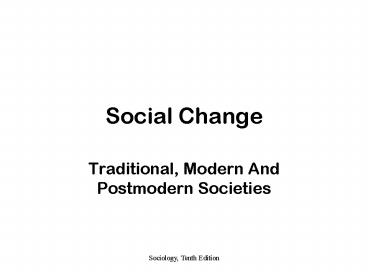Social Change - PowerPoint PPT Presentation
1 / 14
Title: Social Change
1
Social Change
- Traditional, Modern And Postmodern Societies
2
Social Change the transformation of culture and
social institutions over time
- Four major characteristics
- Social change is inevitable, only the rate of
change varies - Social change is sometimes intentional, but often
is unplanned - Social change is controversial
- Some social change matters more than others
3
Why Cultural Change Takes Place
- Culture and change
- Invention
- Production of new objects, ideas, and social
patterns - Discovery
- Taking note of existing elements of a culture
- Diffusion
- The spread of products, people and information
from one culture to another
4
Other Reasons Why
- Conflict and social change
- Tensions and stressors between individuals and
groups can bring about change - Different groups gain and lose power and
privilege as they struggle for their own
positions - Ideas and change
- Ideas can fuel social movements which bring about
social change - The idea of equal rights for everyone
- Demographics and change
- Increases and decreases in numbers can lead to
social change as society may need to expand
and/or contract - Need for jobs, housing, education, etc
5
National Map 24-1 Who Stays Put? Residential
Stability across the United States
6
Modernity Social Patterns Resulting From
Industrialization
- Peter Burger identified four characteristics of
modernization the process of social change
begun by industrialization - Decline of small, traditional towns
- High-tech communications puts small towns in
touch with the world - Expansion of personal choice
- An unending series of options referred to as
individualization - Increasing diversity in beliefs
- Modernization promotes a more rational,
scientific world-view - Future orientation and growing awareness of time
- People living in industrialized nations tend to
focus more on the future than on the past
7
Ferdinand Tonnies Loss of Community
- With modernization comes the loss of
gemeinschaft, or human community - Loss of community caring and the beginning of
individualization and a business-like emphasis - Modernity brings about a condition referred to as
gesellschaft, or impersonal relationships - People live among strangers and ignore most they
pass on streets - Critical evaluation
- Gemeinschaft exists in modern society
- Didnt distinguish between cause effect
- Romanticized traditional societies
8
Emile Durkheim Division of Labor
- Modernization is marked by increases in a complex
division of labor - People performing highly distinctive roles rather
than everyone performing the same daily routines - Society transformed from mechanical to organic
solidarity - Mechanical solidarity refers to a time when
society was held together by social bonds
anchored in common moral sentiments - Organic solidarity refers to modernity during
which time social bonding is accomplished by way
of mutual dependence - Critical evaluation
- Societies norms and values strong enough to
avoid anomie - People value the personal freedom of modern
society despite the risks
9
Max Weber and Rational Society
- Modernization means replacing a traditional
worldview is nothing more than the with a
rational way of thinking - Modern people value efficiency, have little
reverence for the past and adopt whatever social
patterns allow them to achieve their goals - Critical evaluation
- The alienation he attributes to bureaucracy
actually stems from social inequality
10
Karl Marx Capitalism
- Industrial revolution was a capitalist revolution
- Social conflict in capitalism sows seeds of
egalitarian socialist revolution - Critical evaluation
- Complex theory underestimates dominance of
bureaucracy - Stifling socialist bureaucracies as bad or worse
than dehumanizing capitalism
11
Theoretical Analysis of Modernity
- Structural-functional theory
- Mass society is a society in which prosperity and
bureaucracy have eroded traditional social ties - Draws upon the ideas of Tonnies, Durkheim and
Weber - Social-conflict theory
- Class society is a capitalist society with
pronounced social stratification - Draws upon the ideas of Marx
- Critical evaluation
- Mass society ignores social inequality,
romanticizes the past - Class society overlooks the way equality in
modern society has increased
12
David Riesman Modernity the Individual
- Personal identity can be a problem since society
changes so rapidly Inherent instability - Social character refers to personality patterns
common to members of a particular society - Tradition-directedness refers to rigid conformity
to time-honored ways of living - Other-directedness refers to a receptiveness to
the latest trends and fashions, often expressed
in the practice of imitating others
13
PostmodernitySocial Patterns Characteristic of
Postindustrial Societies
- In some ways, modernity has failed
- Much poverty and stress
- The bright light of progress is fading
- Less confidence about future
- Science no longer holds the answers
- Science has created its share of problems
- Cultural debates are intensifying
- The promises of social movements have not been
fulfilled - Social institutions are changing
- All institutions are going through change,
including the most basic, the family
14
Amitai Etzioni the Communitarianism Movement
- Strong rights presume strong responsibilities.
Four proposals - Halt expanding culture of rights
- Placing individual interests over the interests
of the community is wrong - Nothing in the constitution allows us to do
whatever we want - All rights involve responsibilities
- Cannot keep taking without giving back
- Certain responsibilities that no one is free to
ignore - Upholding the law or protecting the environment
- Defending some community rights may require
limiting individual rights - Protecting the public interest may require drug
testing of certain workers































